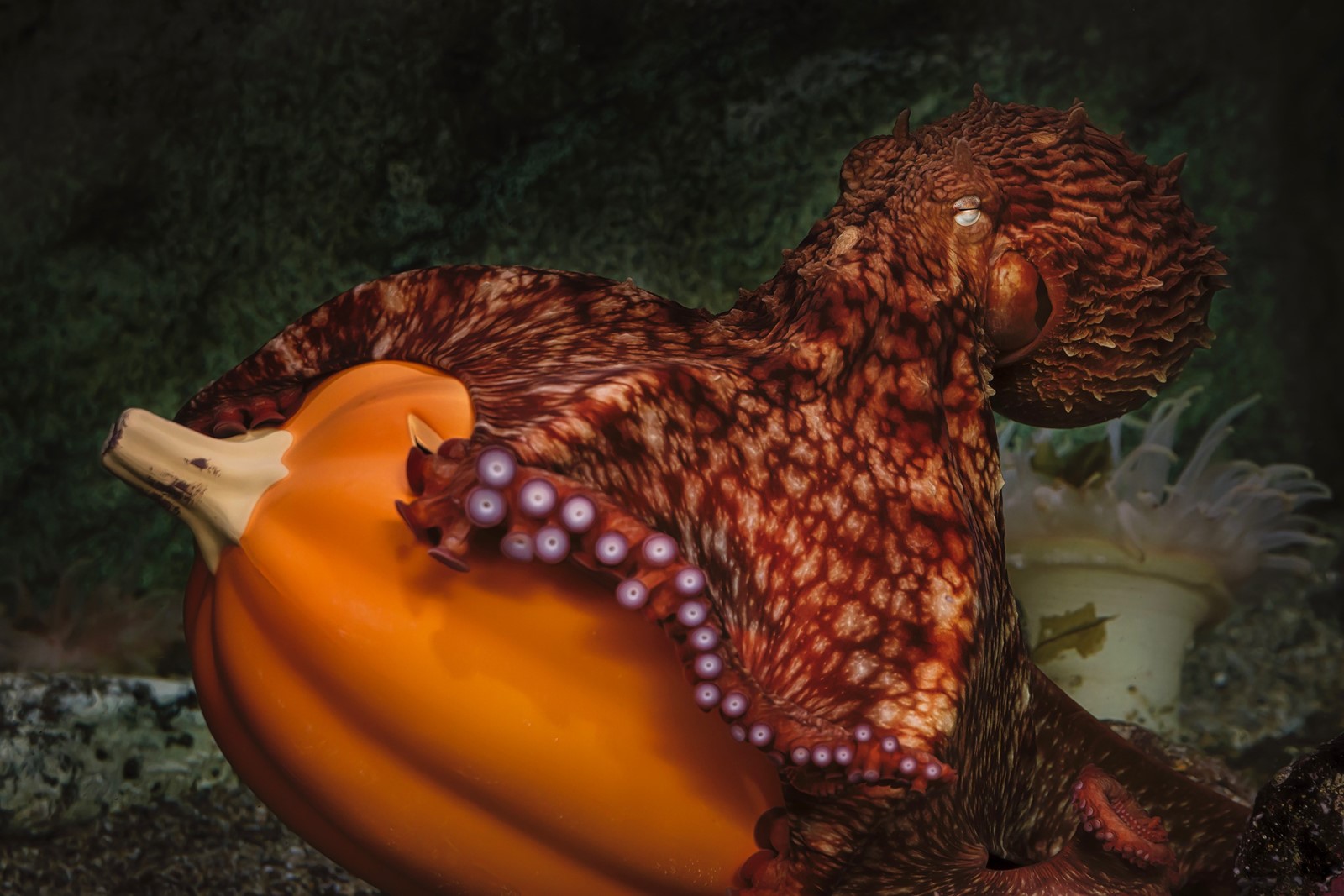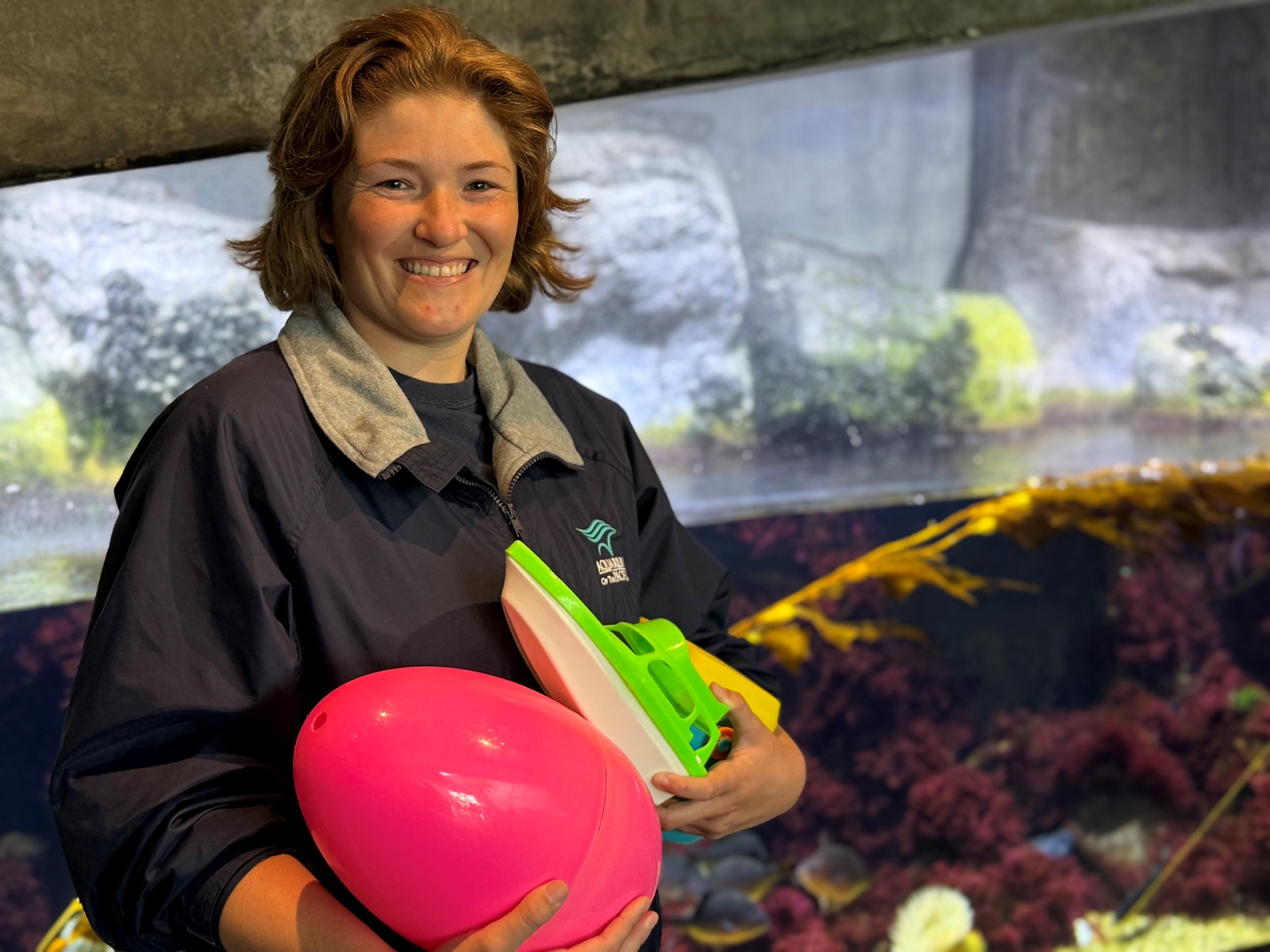

This is a different kind of ghost story.
It’s about an octopus. Her impending death. And the love and wonder she has inspired.
I first heard about Ghost, the giant Pacific octopus at Long Beach’s Aquarium of the Pacific, in September. She had caught my eye because I had just finished reading, “Remarkably Bright Creatures,” a novel by Shelby Van Pelt about the unlikely friendship between a grieving widow and a giant Pacific octopus at a small-town aquarium.
For me, the book did for octopuses what “A Dog’s Purpose” did for dogs: It made me love them even more.
So when I saw a story online about Ghost — the aquarium’s beloved octopus who had recently laid her eggs — I was especially intrigued. I had to find out more: Who are the people who care for this animal? And how do they cope with her inevitable end?
Because here’s the thing: Laying eggs is a bittersweet milestone for octopuses. It marks the beginning of their final life stage, called senescence. During this time, which can last anywhere from one to 10 months, the female stops eating and devotes all her energy to her eggs as her own body deteriorates. (Males have it even worse; they die shortly after mating.)
For Ghost, a 45-pound octopus believed to be between 2 and 4 years old (the average lifespan for her species), it means she’ll fiercely guard her eggs, using her arms to circulate water around them, even as her body breaks down. A female octopus generally dies around the same time, or just after, her eggs hatch.
What’s particularly sad about Ghost’s story — depending on how you look at it — is that her eggs are unfertilized. They will never hatch. This was an intentional choice by aquarium staff, since the octopus mating ritual can be perilous — even deadly — for both males and females.
“Our priority is always going to be our animals’ health and well-being, and because of that, we did make the decision not to pair her with a mate,” said Ghost’s primary caretaker, Brooke Hernandez. “Female octopuses will go through their natural egg-laying process whether or not those eggs are fertile.”
Since entering senescence, Ghost has been moved to a private area of the aquarium, where she can live out the rest of her days undisturbed by the public.
So far, she’s doing well and showing only subtle signs of slowing down — being a little less social, a little pickier with food.
“We want to make sure that she is at the optimal comfort that she could possibly be,” Hernandez said.
Like all giant Pacific octopuses, Ghost is a solitary creature.
But she has playmates.
Hernandez, for one. A senior aquarist with more than a decade of experience caring for marine mammals and invertebrates, the Orange County resident has been with Ghost since the octopus’ arrival at the aquarium in 2024, when she was acquired from a vetted scientific collector.
It didn’t take long for Hernandez to see that Ghost had a special personality.
“Trying to get work done with an octopus around is a challenge,” Hernandez joked, telling me how Ghost likes to steal tools and climb on her when she goes into the tank to do maintenance. “Even though they’re solitary, they seek out interaction with us.”
Hernandez described Ghost as a playful, mischievous little cephalopod who loves playtime even more than food.
“A lot of times I’ll be playing with her and I’ll say, ‘Hey, here’s some of your food,’ ” Hernandez said. “And she will toss the food aside because she doesn’t want her eating time to get in the way of her playtime.
“This is why she’s so beloved by us all,” she added. “She sought out human connection.”
She’s a sly one, too. When Hernandez makes her weekly scuba dive into Ghost’s enclosure for cleaning, Ghost likes to unzip her booties or take off her face mask and snag the objects for herself.
“My mask is wildly entertaining for an octopus,” Hernandez said. “She loves to take that off, and I can’t work without a mask underwater, so I have to stand there and wait for her to give it back.”
That said, Ghost can be cooperative. When she needs to be weighed, for instance, she’s trained to slither her little body into a basket so that Hernandez can lift her out of the water and put her on a scale.
Sometimes, Hernandez said, Ghost will hold her hand while she works — one soft tentacle curled around a human palm.
“I’ve worked with a lot of octopuses. They’re all very special and I love them all dearly,” she said, “but I think Ghost definitely holds a really special place in my heart, and that one’s going to be a hard loss.”
As far as boneless creatures go, octopuses are unusually intelligent — arguably the smartest invertebrates on Earth, according to experts. They have been known to solve mazes, open screw-top jars and use tools.
In 2016, Inky, a common New Zealand octopus at the National Aquarium of New Zealand, escaped his tank by squeezing through a gap in the lid, crawling across the floor and slipping down a 6-inch diameter drain pipe to the ocean.
Fun fact: Every suction cup on an octopus’ tentacles has its own ability to taste and feel. In fact, researchers say, each sucker can detect textures and chemicals, and even distinguish between familiar and unfamiliar objects.
That means when Ghost wraps her arms around a toy (Hernandez said her favorite is a clear plastic hamster ball that she loves to pry open when it’s stuffed with treats), she’s not just holding it; she’s studying it, tasting it and learning what it is in a way no human hand ever could.
“Every single octopus is different, which makes them really fun and challenging to work with,” Hernandez said. “Some can be shy and more reserved; others are very boisterous and want to play and interact. We really bond with these animals.”
With such a close bond, you’d think Ghost’s transition to senescence would take an emotional toll on her keepers.
But Hernandez said it is all part of the animal’s life cycle.
“You sort of build up an understanding for it,” she said. “It’s always a sad time, but there’s also something beautiful about the natural life cycle of an animal.”
The internet, of course, is an emotional wreck. Ghost has become somewhat of a social media celebrity since the aquarium released a post on Sept. 8 announcing her senescence.
The post garnered thousands of views and made national and international news, with fans expressing their love for the eight-armed superstar. One person said they had Ghost tattooed on their arm; others said they had Ghost emblazoned on their clothing.
The aquarium welcomed the publicity.
“This story about her end of life is very natural,” Nate Jaros, the vice president of animal care for the Aquarium, said in a CBS News video online. “This is something that we predict, that we come to terms with — it is normal and healthy.”
In an email, Jaros told me he hopes Ghost’s story serves as inspiration. There are other octopuses currently housed at the aquarium, including a young giant Pacific octopus that arrived shortly before Ghost entered senescence. People can see her in the aquarium’s second floor Northern Pacific Gallery.
“Ghost is beloved by staff, visitors and those who learned about her online,” Jaros said. “We know people care about these intelligent animals as much as we do. We hope this inspires more people to care about marine life and become ocean stewards.”


 PREVIOUS ARTICLE
PREVIOUS ARTICLE
